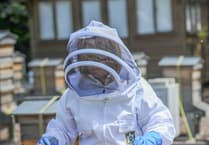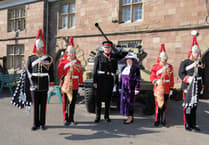Members of the Gwent Ornithological Society are urging the public to campaign against the granting of a three-month licence for the culling of cormorants and goosanders on the River Usk. The Usk Fishing Association was given a licence to shoot 12 cormorants and six goosanders between January and March and Gwent bird watchers fear that another could be granted in the near future. The permit, which is granted by Natural Resources Wales, gives the authority for the license holder and five other named people to take part in the cull under the terms of the Wildlife and Countryside Act 1981. The permits are now available from NRW for the culling of specific numbers of birds to preserve fisheries. Natural Resources Wales is among several organisations that has added cormorants and goosanders to the general licence as part of a management plan due to the damage they are doing to fish stocks on rivers and lakes The Gwent Ornithological Society however has spoken out against these licences, saying that the culls are reducing the numbers of birds, and spoiling the enjoyment of birdwatchers across the region. A spokesperson for the GOS said, "For many birdwatchers to see a pair of goosanders or a female with a brood of ducklings is a highlight of any day's birdwatching along our rivers. They nest in holes in trees and start breeding in March. "For these licences to be permitted at this time of year when breeding begins is quite appalling, and we were shocked to see that Natural Resources Wales permitted this action." NRW implemented the licences with a number of restrictions and the licence on the Usk was in place for a three month period, from January to March 2014, and allowed the killing of 12 cormorants and six goosanders - which represents 10 per cent of the estimated population of cormorants that reside around the River Usk, and considerably lower for goosanders. The birds can only be shot with 12, 16 or 20 bore shotguns, which create the maximum noise in an effort to frighten the remaining birds away and the culling can only take place when there are two or more birds present, as the shooting of the birds aims to 'reinforce scaring'. A spokesman for NRW said, "We only issue licences to fisheries that are already using the widest possible range of auditory and visual scaring techniques, which includes firing blanks. "However, birds do become habituated to all of these and soon realise that a shotgun is not a threat, unless they actually witness a bird being shot. "That is why shooting is only allowed to reinforce scaring (rather than for culling), and is only allowed when birds are present in groups. "Our staff visit each applicant to give advice on fishery management, including habitat improvements, proofing and scaring and to determine whether there are any alternatives to licensed shooting. Licences are only granted when all practicable alternatives have failed." Commenting on birdwatchers' fears that the cull was being undertaken during the nesting season, the NRW said it took extra precautions to map the span of the licence and to ensure that the timing of a licence would not result in cormorant or goosander chicks losing a parent. In addition to this, it addressed the fears that this action could be abused, stating it had the right to monitor compliance with licence conditions and will take very seriously any breaches, which could result in legal action. The spokesperson for NRW said, "If a licence is granted, it is subject to strict conditions. Anyone who provides false information to obtain a licence, or breaks the conditions of their licence is liable to a fine of up to £2,500." Dr Stephen Marsh-Smith, director of the Wye and Usk Foundation, has spoken in favour of the licences, and argues that this implementation is simply a way of restoring balance between the birds and fish. Dr Marsh-Smith said, "With depleting numbers of salmon across the country, efforts need to be made to control the amount of birds eating them and harming local fisheries. "Goosanders can eat high numbers of juvenile salmon every day, and with the high numbers of birds regularly seen around the River Usk, it is simple maths to know that something has to be done about this." But the GOS feels that this excuse is flimsy, and the application of this licence from the Usk Fishing Association appears to be simply a way to keep fish numbers up for their hobby. The GOS spokesperson added, "We understand that cormorant and goosanders do eat these fish but they need fish to survive. Fishermen are fishing for recreational purposes - they do not need to eat the fish they catch." However Dr Marsh-Smith insisted this was not the case, and said, "The culling is not a mindless effort to increase fish stock for fishermen, it is vital to create balance to keep fish in our rivers, and to help the depleting population of salmon survive." The GOS has taken its complaints to the NRW, but while the river authority said it understood the concerns raised, it felt that this licence was justified under the Wildlife and Countryside Act, and appropriate precautions had been put in place to avoid any abuse. The spokesman from GOS added, "We hope that we can inform more people about what is going on here, so they can speak out against these licences, and to preserve our bird population surrounding the River Usk." For more information on the licences from NRW, visit naturalresourceswales.gov.uk, and for more on the work of the Gwent Ornithological Society, visit gwentbirds.org.uk
Birdwatchers' anger over 'licence to kill' on the Usk
Thursday 24th April 2014 10:00 pm




Comments
This article has no comments yet. Be the first to leave a comment.